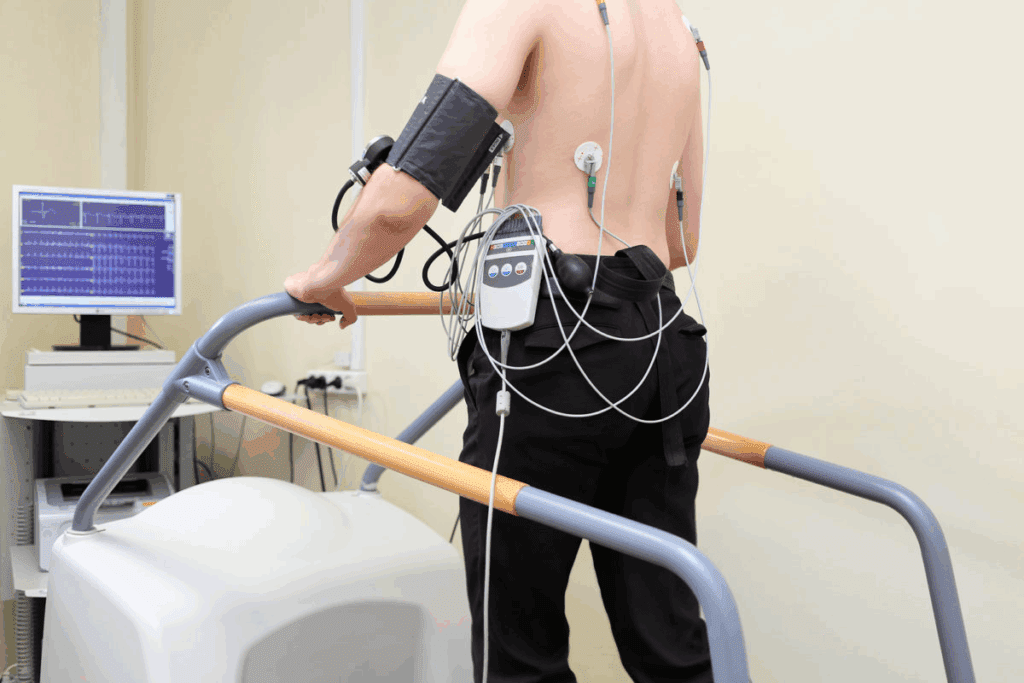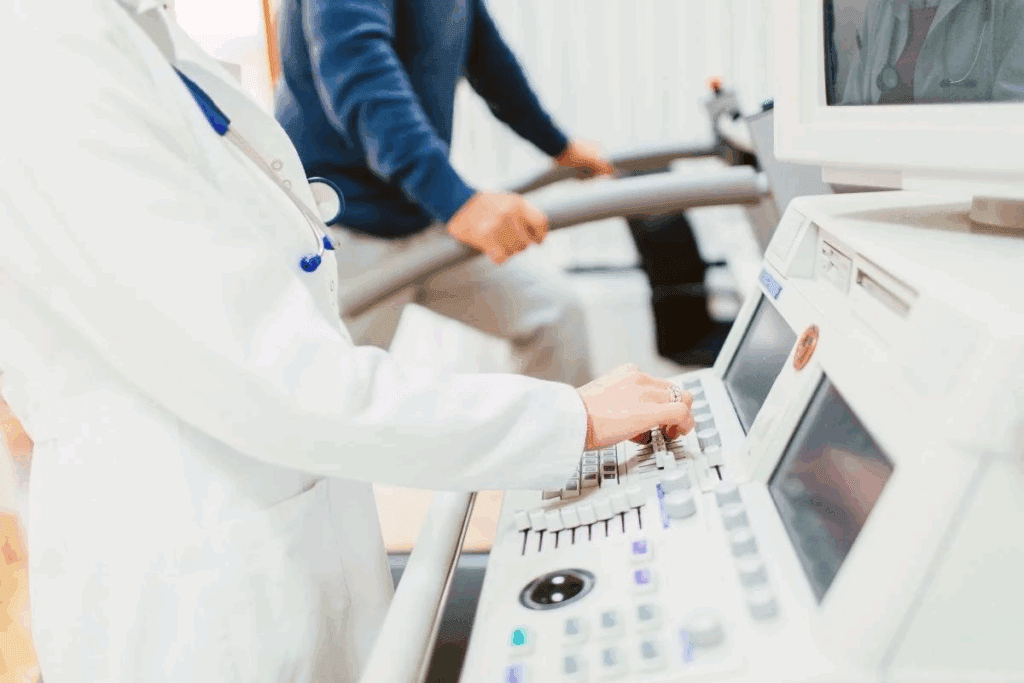
At Liv Hospital, we know how vital accurate heart checks are. A heart nuclear stress test is a tool that uses special medicines and nuclear scans. It checks how well blood flows and the heart works.
During this test, certain medicines are given. They either mimic the effects of exercise or help make the images clearer. It’s important for patients to know about these medicines. We aim to give top-notch healthcare and support to international patients, ensuring they get the best care.

It’s important to know about heart nuclear stress tests. Nuclear stress tests help doctors see how well the heart works when it’s stressed. This stress can be from exercise or medicine.
A tiny bit of radioactive material, called a radiopharmaceutical, is put into your blood. This material helps doctors see how blood flows in your heart at rest and when it’s stressed. The test has two parts: when you’re resting and when you’re stressed. Pictures are taken after each part to compare blood flow.
“The nuclear stress test is a key tool for doctors,” says a top cardiologist. “It shows us where the heart might not get enough blood. This helps us decide how to treat it.”
Nuclear stress tests are great for finding coronary artery disease (CAD). They show how blood flows to the heart muscle at rest and when stressed. Doctors can see where blood flow is low, which means CAD might be present. This info is key for choosing the right treatment.
These tests are for people with known or suspected CAD. This includes those with symptoms like chest pain or shortness of breath. It also includes those at risk, like those with high blood pressure, diabetes, or a family history of heart disease.
Knowing who needs these tests helps doctors use them wisely.

Nuclear medicine has changed how we diagnose and manage heart disease. It gives us valuable insights into how the heart works. Nuclear stress tests use small amounts of radioactive materials to create images of the heart at rest and under stress.
Nuclear medicine shows how blood flows through the heart. It uses radiopharmaceuticals that the heart muscle takes up based on blood flow. This helps us see if the heart is getting enough blood, mainly when it’s stressed.
To do this, a small amount of radiopharmaceutical is injected into the blood. It then builds up in the heart muscle. A special camera picks up the radiation from this substance, making detailed heart images.
Radiopharmaceuticals are key in cardiac imaging during nuclear stress tests. They are made to show areas of the heart with low blood flow. This helps diagnose coronary artery disease and other heart issues.
These substances are safe and work well. They help doctors make accurate diagnoses and plan treatments.
Understanding nuclear stress test results needs nuclear cardiology expertise. The images from the test are studied to see how the heart works. They help find areas with low blood flow and diagnose heart problems.
Important things looked at include:
By looking at these, doctors can give accurate diagnoses. They can then suggest the best treatments for heart disease.
Stress testing is key in heart health checks. Patients might get either exercise or pharmacological stress tests, based on their health. Exercise tests are preferred as they show how the heart works when active. But, some can’t do the exercise needed because of health issues.
For those who can’t exercise, pharmacological stress testing is a good choice. This method uses drugs to make the heart work like it does during exercise. Stress test medication makes the heart rate go up or the arteries open wide, just like exercise.
“Pharmacological stress testing is a key tool in cardiology,” says a top cardiologist. “It’s a reliable way to find heart disease in those who can’t do regular exercise tests.”
Medications for stress testing work in unique ways to mimic exercise. Vasodilators like adenosine and dipyridamole make the heart’s arteries wider, boosting blood flow. Dobutamine, on the other hand, makes the heart beat faster and stronger, just like exercise.
Pharmacological stress testing is mostly safe, but it’s important to choose the right patients and watch them closely. Side effects can include chest pain, breathing trouble, and low blood pressure. So, it’s vital to have skilled doctors giving these tests and reading the results. Some patients, like those with severe asthma or heart block, might need other tests.
In short, pharmacological stress testing is a vital option for those who can’t do exercise tests. By knowing when and how to use stress test medication, doctors can make sure everyone gets the care they need.
Dipyridamole is a top choice for stress tests, helping check heart health. It’s used in nuclear stress tests to mimic exercise for those who can’t exercise. This is key for patients who can’t do physical tests.
Dipyridamole blocks adenosine uptake in platelets and cells, raising adenosine levels. This causes blood vessels to widen, which is vital for stress tests. It helps see how blood flows in the heart during stress.
Its main effect is vasodilation, which helps spot heart flow issues. This is important for finding heart disease. Dipyridamole makes tests work like exercise, giving doctors useful info.
Dipyridamole is given through an IV, usually 0.56 mg/kg over 4 minutes. It’s important to follow the right dose for safety and accuracy. Patients should avoid caffeine and methylxanthines 24 hours before.
During the test, patients are watched for side effects. Their heart rate, blood pressure, and ECG are checked. The test drug is given 3-5 minutes after dipyridamole, and images are taken soon after.
Dipyridamole is mostly safe but can cause side effects like chest pain and dizziness. Rarely, it can lead to serious reactions. Aminophylline is used to counteract severe side effects.
It’s vital to have a well-prepared lab with skilled staff for the test. Educating patients about possible side effects is also key.
Managing side effects includes:
Adenosine is a natural vasodilator used in cardiac stress testing. It simulates exercise effects on the heart. This is for patients who can’t do physical stress tests.
Adenosine stimulates A2A receptors, causing the heart’s blood vessels to widen. This boosts blood flow to the heart muscle. It helps find blockages or issues through imaging.
The vasodilatory effect of adenosine is key. It shows if parts of the heart get too little blood. This could mean coronary artery disease.
Adenosine is given through an IV, usually in a vein. The usual dose is 140 mcg/kg/min for 6 minutes.
Adenosine is mostly safe but can cause side effects. Common ones are:
These side effects usually go away soon after stopping the infusion. Sometimes, aminophylline is used to counteract adenosine’s effects.
Knowing how adenosine works and how it’s given helps us see its role in heart tests. It’s good for patients going through these tests.
Dobutamine is a good choice for heart tests in people with lung disease. It’s great for those who can’t do stress tests with vasodilators because of their lungs.
Dobutamine makes the heart work harder, like exercise does. It boosts heart rate and strength, improving how well the heart pumps. This is key for those who can’t exercise because of health issues.
The drug boosts heart rate and strength by acting on beta-1 receptors. This makes the heart act like it’s exercising, even if the person isn’t moving.
Dobutamine is given in small amounts that increase over time. This careful increase helps the heart work harder without too many side effects.
This slow increase lets doctors watch how the patient reacts and adjust the dose if needed.
It’s very important to watch patients closely while they’re getting dobutamine. This ensures their safety and the success of the test. Doctors should keep an eye on:
Keeping a close eye on these things helps doctors quickly fix any problems and adjust the dobutamine dose.
In summary, dobutamine is a great option for heart tests in people with lung disease. It helps the heart work hard without needing exercise, making it a key part of nuclear cardiology.
In nuclear cardiology, radiopharmaceuticals are key for seeing how blood flows and functions in the heart. These special compounds are made to be taken up by the heart muscle, showing how well blood flows. This helps doctors diagnose heart diseases and other conditions.
Technetium-99m sestamibi, also known as Cardiolite, is a top choice for nuclear stress tests. It’s a technetium-99m labeled compound that builds up in the heart muscle based on blood flow. The images it creates are very useful for checking how well the heart muscle is working.
Technetium-99m sestamibi is great because it has the right half-life and energy for gamma camera imaging. It’s also stable and has a low radiation dose, making it safe for patients.
Thallium-201 chloride is another important radiopharmaceutical in nuclear cardiology. It was one of the first used for heart imaging and is used today, mainly for certain patients. It shows how well the heart muscle is working by being taken up by it.
Thallium-201 chloride is special because it can change its distribution over time. This means doctors can check the heart under stress and at rest without needing to give the patient more than one injection. But, it has a longer half-life and lower energy than technetium-99m, which can make images less clear.
Newer agents in nuclear cardiology are being developed. These agents aim to give better images, lower radiation doses, and more accurate diagnoses. Examples include technetium-99m labeled agents like tetrofosmin and newer compounds being tested in clinical trials.
The push for these newer agents comes from the need for better and safer diagnostic tools. They could lead to better patient care by helping doctors make more accurate diagnoses and choose the best treatments.
| Radiopharmaceutical | Characteristics | Clinical Use |
| Technetium-99m Sestamibi | Favorable physical characteristics, stable, low radiation dose | Myocardial perfusion imaging, viability assessment |
| Thallium-201 Chloride | Redistribution properties, longer half-life | Myocardial perfusion imaging, viability assessment |
| Newer Generation Agents | Improved image quality, lower radiation doses | Enhanced diagnostic accuracy, safer imaging |
Nuclear stress testing needs more than just getting ready physically. You also have to adjust your medications carefully. This is key to getting accurate results from the test.
Beta-blockers help control heart conditions by lowering heart rate and blood pressure. But, they might mess with the test’s ability to check how your heart works under stress. It’s best to talk to your doctor about stopping beta-blockers before the test. This way, your heart rate can be right for the test.
Calcium channel blockers are another type of heart medication. They can change how your heart works and its rate. Following your doctor’s advice on these medications is very important. It helps make sure your test results are as good as they can be.
Nitrates help with angina, and blood thinners stop blood clots. Nitrates might change blood flow and affect test results. Blood thinners are usually kept up to prevent clots. But, telling your healthcare team about all your medications is vital. This helps make the best plan for your test.
Managing your medications before a nuclear stress test is important. It helps your healthcare team get the best results for your care.
At Liv Hospital, we use the latest in nuclear cardiology to get precise results. Our team includes experts from different fields. This ensures we offer the best care for each patient.
Our team includes cardiologists, radiologists, and nuclear medicine specialists. They work together to create care plans that fit each patient’s needs. This teamwork means patients get care that’s just right for them.
We always use the newest research and technology in our tests. This keeps us leading in nuclear cardiology. It helps us give our patients the most accurate diagnoses and treatment plans.
At Liv Hospital, we follow international standards for nuclear stress testing. This ensures our services meet the highest global standards. Our protocols follow guidelines from top medical organizations.
Cardiac nuclear medicine is always getting better, with new research and tech coming out all the time. At Liv Hospital, we make sure we know about these new things. This way, we can offer our patients the best care available.
New research has made nuclear stress tests better. It’s also led to new medicines for imaging. For example, new SPECT technology has made images clearer and more accurate.
By using these new things, we can give our patients advanced care they couldn’t get before.
We’re proud of our advanced protocols, team care, and following international standards. Our goal is to give our patients the best care possible. We use the latest research and technology to do it.
Getting ready for a nuclear stress test is key to getting the best results. At Liv Hospital, we focus on complete care for your heart. This means you get the right diagnosis and treatment plan.
We’ve talked about the medicines used in these tests. This includes drugs like dipyridamole and adenosine, and special imaging agents. Knowing about these medicines helps you feel ready for your test.
We use the latest in heart care to help our patients. Our goal is to give you top-notch care that fits your needs. This way, you get the best health outcomes.
If you’re getting ready for a test, talk to your doctor about any worries. Together, we can make sure you get the best care. And you’ll get the best results from your test.
A nuclear stress test is a test that uses a small amount of radioactive material. It shows how the heart and its blood flow work under stress. This stress is usually caused by exercise or medicine.
Medicines like adenosine, dipyridamole, and dobutamine are used. They make the heart work hard, like it would during exercise.
Radiopharmaceuticals, like technetium-99m sestamibi and thallium-201 chloride, create detailed heart images. They help doctors see how well the heart’s blood flows and works.
Pharmacological stress testing uses medicine to stress the heart. Exercise stress testing uses physical activity, like walking on a treadmill, to stress the heart.
You might need to stop taking certain medicines before the test. Your doctor will tell you which ones and how to adjust your routine.
Side effects of these medicines include flushing, headaches, dizziness, and chest pain. These effects are usually short-lived and managed by medical staff.
Yes, if you have lung disease, dobutamine can be used instead. It doesn’t affect the lungs.
A doctor looks at the test results to find any heart problems. They check for areas where blood flow is low or damaged.
Nuclear medicine is key in cardiac stress testing. It gives detailed images of the heart and blood flow. This helps doctors diagnose and treat heart conditions.
Yes, research is ongoing in cardiac nuclear medicine. New medicines and imaging techniques are being developed. These are being used in places like Liv Hospital.
Subscribe to our e-newsletter to stay informed about the latest innovations in the world of health and exclusive offers!